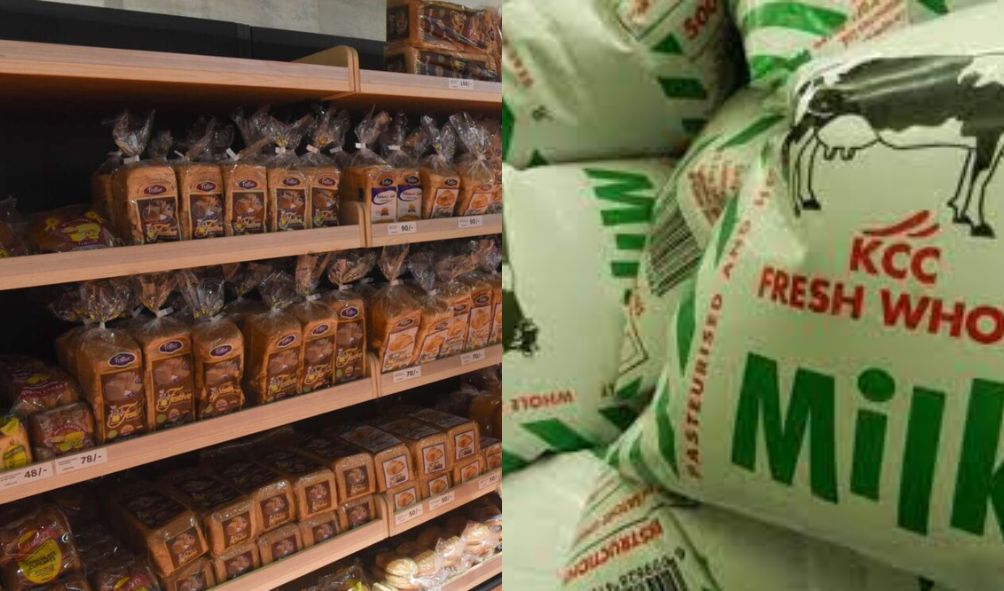Hard times ahead as government mulls plan to impose 16 percent VAT on milk and bread

Treasury Cabinet Secretary Prof Njuguna Ndung’u wants a 16 percent Value Added Tax (VAT) imposed on bread and milk
Treasury Cabinet Secretary Prof Njuguna Ndung’u wants a 16 percent Value Added Tax (VAT) imposed on bread and milk.
If new tax measures proposed by the Treasury pass Parliament, breakfast would become more expensive in the next three months for millions of Kenyan households that have bread and tea for their morning meal.
Prof. Njuguna Ndung’u, the cabinet secretary for the Treasury, wants milk and bread to be subject to a 16 percent Value Added Tax (VAT), which would cause an instant price hike for these two staple foods.
The two are currently zero-rated for VAT, which means that producers of the products can claim tax paid on inputs used in the production process, thereby ensuring that manufacturers do not pass the impact of VAT on the final consumers when determining shelf prices.
Prof Ndung’u however argues that milk and bread are consumed by rich Kenyans, and should be subjected to VAT.
“When we started doing some simulation work, we realized that we can actually gain a lot. Once you have high tax rates, the political remedy is often to try and create a rebate or should I say create refunds for some of the institutions dealing with products that are related and being considered to be consumed by the poor. Total VAT collected in Kenya comprises of about 40.0 percent of the total taxes but 18.0 percent of it goes to tax refunds for products assumed to be consumed by the poor.
When you look at those products, you realise 95.0 percent of refunds go to bread and milk. Who goes to the supermarket to buy bread and milk? We are not compensating the poor, we are compensating the middle class”, Prof Ndung’u said during the Africa Fiscal Monitor session organized by the International Monetary Fund (IMF) on Tuesday.
If passed into law, the proposal will see manufacturers of bread and processors of milk factor in the cost of 16.0 percent Value Added Tax (VAT) on their retail prices.
Prof Ndung’u argues that whereas the provision for zero rating of bread and milk is ideally designed to cushion low-income households from high prices of the staples, studies by government agencies have revealed that as presently structured they largely benefit middle-class Kenyans more than those targeted.
The government now wants to target end-consumers for refunds, other than manufacturers, in a proposed structure whose details are not yet clear.
Njuguna says the government is exploring a mechanism through which consumers will lodge their refund claims directly with the Kenya Revenue Authority (KRA) using receipts generated at the point of purchase. It is a shift that, if implemented, will be banking heavily on the rollout of the electronic tax invoice management system (eTIMS) whose deadline for onboarding is just days away, on March 31st.
The Kenya Revenue Authority (KRA) last week announced the rollout of eTIMS lite, targeting the mass onboarding of taxpayers in the country’s informal sector.
Jowie Irungu files notice of appeal against death sentence
US issues security alert over residential estates in Nairobi
Police officer and driver attached to Governor Orengo sued for robbery with violence
How senators voted to impeach Kisii Deputy Governor Robert Monda
Details emerge how 133 job seekers were rejected by KRA after HIV, pregnancy tests
Kericho Governor heckled infront of President Ruto (VIDEO)
“We missed the boat somewhere. In this age of technology, we can decide that we are going to have personalized tax refunds through one’s receipts when they purchase things in the supermarket. Then we are going to compensate you directly and not through the firm,” Prof Ndung’u said.
The Kenya Association of Manufacturers (KAM) says that the perception that bread and milk are products consumed largely by the middle class in Kenya is misguided, and could trigger adverse outcomes.
“This in our view is counterproductive. If you look at a place like Nairobi, close to 67.0 percent of the residents are in some form of informal settlements, the middle class is really a minority. If you change the zero-rated status of bread and milk, you will push these products further into being unaffordable and the impact will be felt most at the bottom of the pyramid among vulnerable Kenyans at a time when the cost of living is already high. If you think about milk, the majority will now start consuming unprocessed milk which is unsafe and raises health concerns”, said the KAM CEO, Anthony Mwangi.
The Consumer Federation of Kenya, Cofek, also poked holes into the idea being considered by the Treasury, saying it risks inflicting a larger burden on the low-income earners in the country.
“The immediate effect will be a surge in prices and the deepening of less consumer purchasing power hence Kenyans opting for unhealthy alternatives especially for milk. Again, the proposals from the National Treasury are easier said but impractical to implement. For instance, refunding a consumer based on a receipt will open more cases against KRA on potential fraud and failure to honour genuine cases. If the Oil Marketing Companies struggle to get their refunds, why not even deal with manufacturers or at worst retailers? Refunds to individual consumers would be a nightmare”, said Cofek Secretary General, Stephen Mutoro.
Also read,
Inside high-level meeting set to determine Raila fate in AUC post
Ruto issues one condition for lifting ban on forest farming
Justice Grace Nzioka says she’s proud of her work days after sentencing Jowie to death
Uproar after a male student is held hostage and tortured by a woman
Details of Ruto meeting with Museveni and Suluhu in Zanzibar
Jacque Maribe accompanies CS Kuria to a state function as PSC denies her appointment
Follow us






